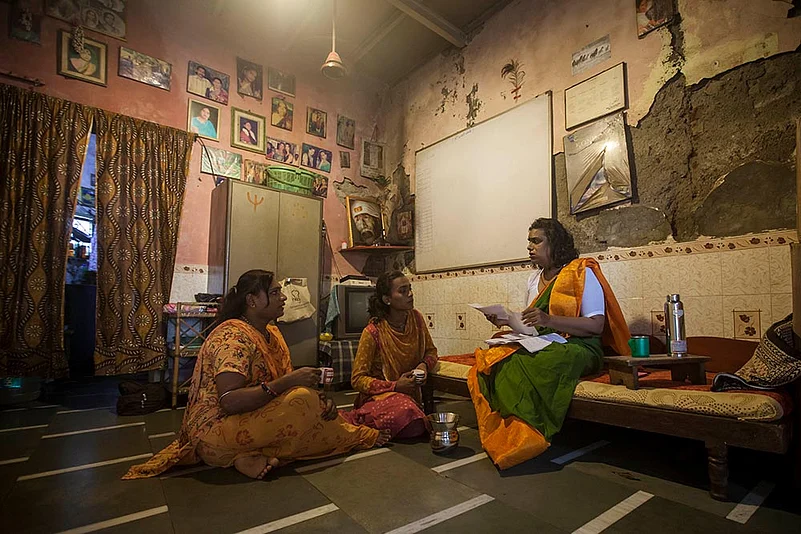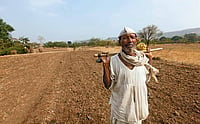At Gauri Sawant’s two-room house in Malvani, Malad, one of Mumbai’s largest slum clusters, her pet Labrador Malhar greets visitors with vigorous tail-wagging. One portion of the barely painted, peeling walls are covered with framed photos. The bonhomie and infectious laughter belie the hard lives of the transgender community settled here.
A rusty, narrow staircase leads to the office of Sawant’s NGO that works for HIV prevention, among other things. Some young hijras are busy at work. Mona, Gauri’s ‘grand chela’, potters around, instructing staffers, ordering milk, feeding Malhar and managing Gauri’s schedules. She is also eagerly awaiting her sex change operation. This is the new face of an age-old structure—the guru-chela system among Mumbai’s Kinnar or hijra community.
Mumbai’s hijra community is estimated to be over a lakh strong, but there is no official figure. Around 40,000 had identified themselves as ‘Transgender’ in a survey two years ago. They are mostly concentrated in slums in areas like Dharavi, Malvani and Vikhroli-Ghatkopar. Children or young adults usually run away from homes once they discover their sexuality and have little option but to join the guru-chela system. The guru looks after the understudy and help him/her mould their lives.
“Discrimination in mainstream society is rampant and we are trying to see if educated hijras can get jobs. I try to teach and train them but it is very difficult. As a guru I would like to see them being absorbed in society,” says Gauri, now a senior activist, who championed the Kinnar Akhada during Ujjain’s Kumbh Mela this year. But it isn’t easy, with internal and external challenges equally daunting. “It is a challenge to motivate them to leave traditional professions such as badhai (dancing and ‘blessings’ at occasions), mangti (begging) and sex work due to prejudices. Not to mention financial reasons,” says Gauri.
At Kinnar Maa Trust, Salma Khan mentors educated hijras who work as accountants, outreach and advocacy workers and project managers. Avanya, who speaks impeccable English, shares an experience at a job interview. “I was selected at a company in Goregaon; we even discussed the salary. They offered me Rs 24,000.... I agreed but while processing my documents, which indicated that I am a TG, they politely told me I would not be accepted. What could I say?” Salma, who is often in film-shoots for dance sequences, says, “We have existed since the time Lord Rama went for his 14-year exile. PM Modi said achhe din ayenge. Hamare liye toh kuch nahin aaye hai.”
Although most hijra gurus or chelas are tight-lipped, it is known that the city’s community is headed by seven nayaks who live in Byculla. They do not entertain the media, nor do they encourage talk about internal practices. The community also has a panchayat of its own where disputes are settled and punishments handed out. Apparently, the community prefers to carry out the ritual of castration (dai nirvana) by a qualified doctor to avoid excessive bleeding. Many are eager to go the whole nine yards, undergo SRS (Sex Reassignment Surgery) and live life as a woman. “That’s how I feel from within. Only then will I be truly happy. I can apply for courses and jobs as a transgender person, certified by doctors and psychiatrists,” says Mona.
The younger lot aspire, but the older generation stares at poverty, illness and often a lonely end. “We follow tradition and do social work, but where is the security? The situation of old hijras is pitiable. We are trying to build a shelter for them and trying to create spaces where they can make products and sell them. Why don’t we get help for businesses like Mahila Gruha Udyog? People still refuse to stay near us or eat food cooked by us,” laments Salma. “I have seen cases where hijras were left to die. We have seen where doctors have botched up surgeries. We have to fight for everything.”
Most hijras welcome the upcoming bill in Parliament, which will give them more rights, but they are wary of its implementation. “For most hijras, there is no alternative support system in place if the guru-chela system were to go. Changes in laws are alright, but we are far from providing social acceptance and security,” says noted LGBT activist Ashok Row Kavi.
Bindumadhav Khire, a Pune-based activist, warns against a possible diluting of the bill. “I haven’t read the bill in detail, but reports say that the reservation clause may not stay. That’s a big setback. The private sector won’t easily change. Just like for women and Dalits, the government needs to do this for transgenders.”
He says the other big step is to remove the label of ‘disorder’, as in medically termed ‘Gender Identity Disorder’ or Gender Dysphoria. Maharashtra is the second state to constitute a welfare board for transgenders, but nothing concrete has happened. Many transgenders have managed to finish secondary education. “They can qualify for Class IV government jobs under reservation. Economic parity will reduce discrimination,” says Khire. Indeed, affirmative action for transgenders would go a long way in getting them find their feet amongst us.


























